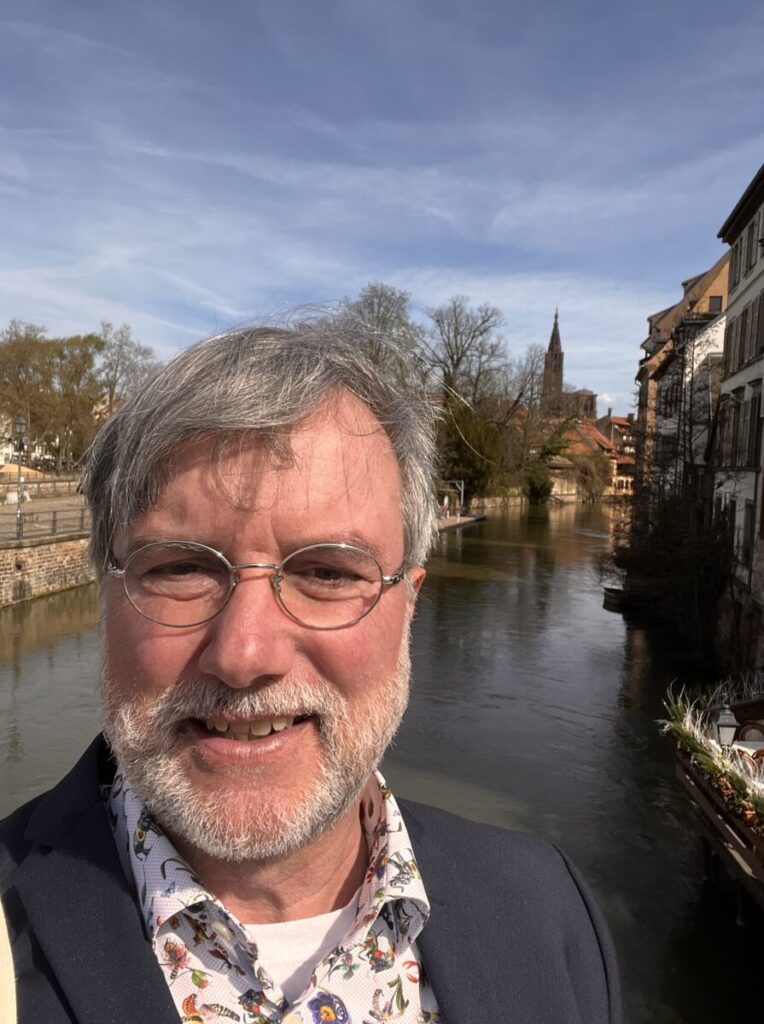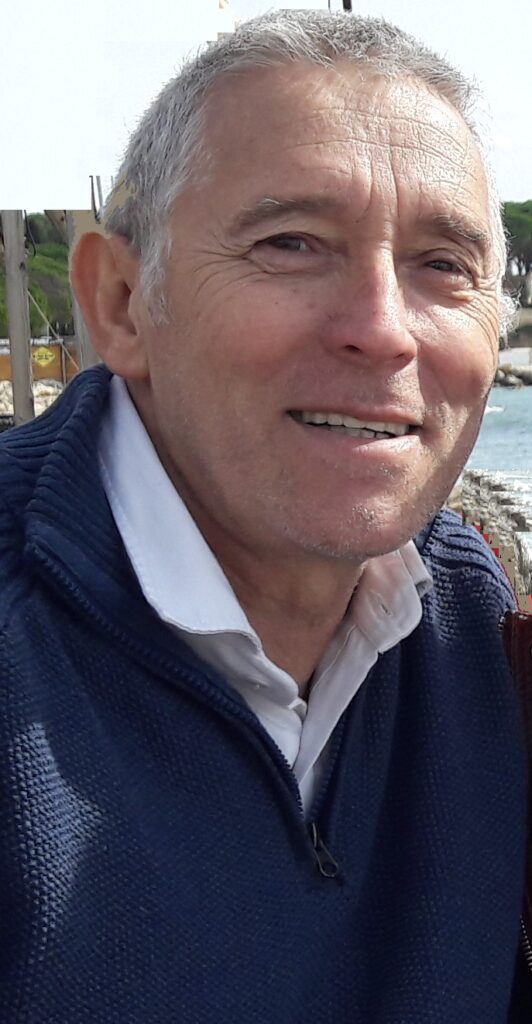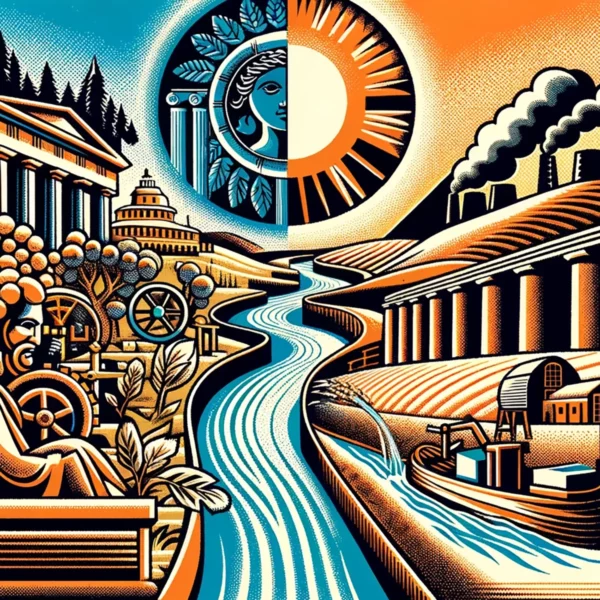Climate change disrupts the water cycle and human activity exacerbates the scarcity of freshwater. Tensions for the control and monopolization of this vital resource are increasing. Similar to oil in the 20th century, water is becoming a source of conflicts. Can we find in the past, especially in regions with riverine cultures, mechanisms that allow resolving tensions among different stakeholders?
The theme is addressed in three forums in a dialogue between the scientists Karl Matthias Wantzen and Bernard Mossé.
Sequence 3 - The ecological crisis compels us to build a new ethic
Bernard Mossé: You often say that not only behaviors need to change, cooperation mechanisms need to be implemented, especially around responsibility areas, etc., but all of this should be supported by a new ethic. You even wrote in our exchanges "a new (old) ethic." Could you start sketching the outlines of this new ethic or this return to an old ethic?
Karl Matthias Wantzen: In ancient cultures, such as Celtic cultures, nature was considered a partner. But it must also be said that the Celts were not yet able to dominate nature in the same way that modern humans can. I do not want to revisit certain cultural elements, revise them, especially regarding respect for nature, but we also need to develop a new ethic based on both our science and our awareness of the very strong impact we have on nature: especially integrating the future in decision-making.
Humanism has brought us an idealization of the human being, in order to live better. But in doing so, by our forward march, we have created a situation where we disconnect ourselves from the future. In my opinion, we need to expand the love that human beings have for each other to include love for nature. I must work for the well-being of my "neighbor," but this neighbor should not only be the human being but also nature, I believe. That's where we need to go: to have compassion for nature, to be proactive towards it, knowing that it is our father, our mother, who supports us.
Therefore, it is necessary to draw inspiration, in part, from ancient cultures that have been systematically repressed, especially in the West, with, I would say, Cartesian ideology, that is, the mechanization and rationalization of natural processes, supported by science and technology, neglecting the emotional and spiritual aspects of humanity. We can rediscover them without necessarily falling into nostalgia for ancient sacred spiritualities.
BM: If I understand you correctly, it is not necessarily essential to return to an ancient spirituality, to the Gaia hypothesis developed by climatologist Lovelock in the 1970s, or to the archaic Pacha Mama of the Andes, the Mother Earth, enshrined in the Constitution of Ecuador in 2008. This new ethics that you are calling for can be summarized by this phrase delivered to us in our first interview by your compatriot and philosopher, Vanessa Weihgold: we must know what the earth gives us and what we must give back to it. Do you agree with this statement?
KMW: Yes, for me, as an ecologist, I understand how ecosystems function. I know that the interactions between the different elements of ecosystems are very complex. But with feedback mechanisms, I can still evaluate and better understand them. For me, this is an exercise devoid of religiosity or even spiritualism. I need to understand which lever I can activate to achieve a certain effect. What are the taboos? Scientific ones? If you disturb the trees at the headwaters, you will trigger a catastrophe, an avalanche, a drought, a flood. And we must integrate this knowledge into this new ethics. We need an ethics based on our understanding of nature, and we are very advanced. The real problem is to act according to our knowledge. We can perfectly synthesize scientific data on one side and the teachings of the ancients on the other. This has been one of the most structuring results of the book I led on river cultures: listening to the fishermen's song on the Senegal River practically means understanding the long-term quality of the river's environment, its hydrology, etc. The rhythm of nature is written not only with hydrographic data but in the lyrics of a song. There is no longer opposition between tradition and modern science: they work very well together.
BM: What you are describing is exciting not only to understand how to build a new ethics but also how to restore trust in scientific knowledge.
Or in other words, what is the scientist's responsibility in promoting a new ethic?
KMW: Researchers need to improve their communication skills. The new master's program that I am in the process of building will include a minimum of 25% soft skills, communication skills among team members, in an interdisciplinary way, among researchers, but also in a transdisciplinary way, that is, with stakeholders in the field, to better understand the dynamics of the stakeholders.
I have analyzed the biosphere of the Dordogne and the nature reserve on the Loire, worked with populations on other river sites around the world, and it's always the same: trust must be built first. It's not just by reading a publication in English describing the complexity of the threats that await them that people will follow me, but especially by providing positive examples. We have many examples of failures where good science-based measures have not been accepted at all by the populations. People were not willing to sacrifice their comfort for a project whose meaning they did not understand. For example, fishermen who did not agree to the abandonment of a dam in favor of a river that nevertheless ensured the sustainability of fishing for decades to come. Communication is very important, and I would say that researchers need to be better in this field. On the other hand, the population should be able to seek information for a better quality of life. It is necessary to organize mechanisms that allow for a win-win situation, with projects developed together by the different stakeholders: we call these "living labs," living laboratories, where we can show operational positive examples, and then transfer them, communicate them from one population to another. For example, a city that has implemented a successful project can communicate to other cities what worked well, what the constraints were, and how to overcome them... This is what I do in all my projects. We have wasted a lot of time redoing the same research on the same problems. Humans need to learn, and learn to transmit and exchange.
For the entire Mediterranean region, better exchange of good practices is crucial, as well as between the Mediterranean and people living further north. It is very important.
In the face of the ecological crisis, the new ethics to be built, based on scientific knowledge, is an ethics of mutual understanding and cooperation.
Biography

Karl Matthias Wantzen studied biology at the University of Constance, completed his PhD on Brazilian waters at the Max Planck Institute, and obtained his postdoctoral qualification on the topic "Biodiversity and nature conservation of large rivers." For 8 years, he led an international cooperation project on the Pantanal in Brazil, the vast floodplain of the Paraguay River.
Since 2010, he has been a professor at French universities, first in Tours, and since 2023 in Strasbourg. In addition to a UNESCO chair "Rivers and Heritage", he also leads an interdisciplinary chair "Water and Sustainability" for the trinational university partnership "EUCOR- The European Campus".
More information on https://ites.unistra.fr/recherche/equipes/bise/karl-matthias-wantzen, https://www.unesco-chair-river-culture.eu/

Bernard Mossé Historian, Head of Research, Education, and Training at the NEEDE Mediterranean association.
Member of the Scientific Council of the Camp des Milles Foundation - Memory and Education, for which he was the scientific manager and coordinator of the UNESCO Chair "Education for Citizenship, Human Sciences, and Convergence of Memories" (Aix-Marseille University / Camp des Milles).
